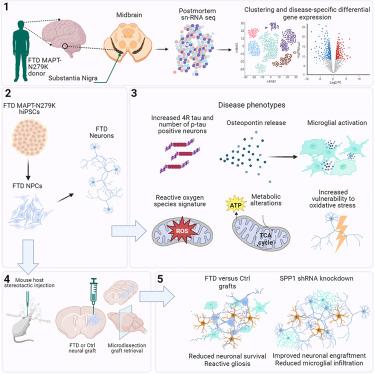Cell Stem Cell ( IF 19.8 ) Pub Date : 2024-04-15 , DOI: 10.1016/j.stem.2024.03.013 Osama Al-Dalahmah , Matti Lam , Julie J. McInvale , Wenhui Qu , Trang Nguyen , Jeong-Yeon Mun , Sam Kwon , Nkechime Ifediora , Aayushi Mahajan , Nelson Humala , Tristan Winters , Ellen Angeles , Kelly A. Jakubiak , Rebekka Kühn , Yoon A. Kim , Maria Caterina De Rosa , Claudia A. Doege , Fahad Paryani , Xena Flowers , Athanassios Dovas , Angeliki Mela , Hong Lu , Michael A. DeTure , Jean Paul Vonsattel , Zbigniew K. Wszolek , Dennis W. Dickson , Tanja Kuhlmann , Holm Zaehres , Hans R. Schöler , Andrew A. Sproul , Markus D. Siegelin , Philip L. De Jager , James E. Goldman , Vilas Menon , Peter Canoll , Gunnar Hargus

|
Frontotemporal dementia (FTD) is an incurable group of early-onset dementias that can be caused by the deposition of hyperphosphorylated tau in patient brains. However, the mechanisms leading to neurodegeneration remain largely unknown. Here, we combined single-cell analyses of FTD patient brains with a stem cell culture and transplantation model of FTD. We identified disease phenotypes in FTD neurons carrying the MAPT-N279K mutation, which were related to oxidative stress, oxidative phosphorylation, and neuroinflammation with an upregulation of the inflammation-associated protein osteopontin (OPN). Human FTD neurons survived less and elicited an increased microglial response after transplantation into the mouse forebrain, which we further characterized by single nucleus RNA sequencing of microdissected grafts. Notably, downregulation of OPN in engrafted FTD neurons resulted in improved engraftment and reduced microglial infiltration, indicating an immune-modulatory role of OPN in patient neurons, which may represent a potential therapeutic target in FTD.
中文翻译:

骨桥蛋白驱动 MAPT-N279K 额颞叶痴呆患者神经元的神经炎症和细胞损失
额颞叶痴呆 (FTD) 是一组无法治愈的早发性痴呆,可能是由患者大脑中过度磷酸化的 tau 蛋白沉积引起的。然而,导致神经退行性变的机制仍然很大程度上未知。在这里,我们将 FTD 患者大脑的单细胞分析与 FTD 干细胞培养和移植模型结合起来。我们鉴定了携带MAPT-N279K突变的 FTD 神经元的疾病表型,这些表型与氧化应激、氧化磷酸化和神经炎症以及炎症相关蛋白骨桥蛋白 (OPN) 上调有关。人类 FTD 神经元在移植到小鼠前脑后存活率较低,并引起小胶质细胞反应增加,我们通过显微解剖移植物的单核 RNA 测序进一步对其进行了表征。值得注意的是,OPN 在移植的 FTD 神经元中的下调导致移植改善和小胶质细胞浸润减少,表明 OPN 在患者神经元中具有免疫调节作用,这可能代表 FTD 的潜在治疗靶点。











































 京公网安备 11010802027423号
京公网安备 11010802027423号